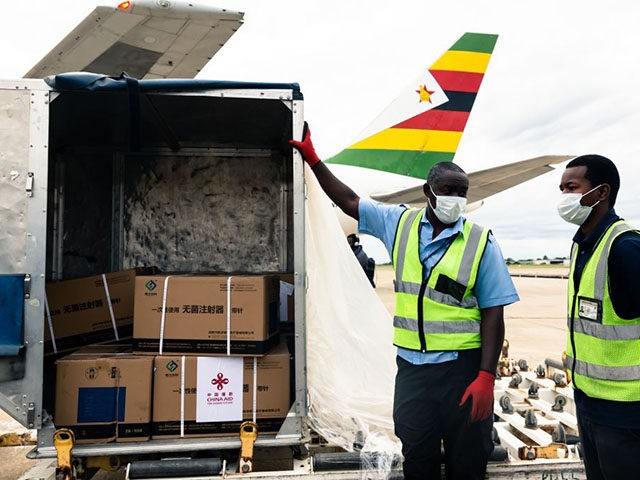The government of Zimbabwe took delivery of 200,000 doses of China’s dubious Sinopharm coronavirus vaccine on Monday and urged its citizens to sign up for shots as quickly as possible.
Both Zimbabwean health experts and average citizens have expressed concerns about the safety and effectiveness of the Chinese product, and some are nervous about vaccines in general.
Zimbabwean President Emmerson Mnangagwa and his top officials offered fulsome thanks to China for the first shipment of Sinopharm vaccine:
The first batch of vaccines for Zimbabwe has been successfully delivered. We start vaccinating Zimbabweans this week!
The faster our country is protected against this virus, the faster Zimbabwe’s economy can flourish.
God bless you all, god bless Zimbabwe! 🇿🇼 pic.twitter.com/u2noXMWcnR
— President of Zimbabwe (@edmnangagwa) February 15, 2021
China’s ambassador to Zimbabwe, Guo Shaochum, ceremonially presented the vaccines to Mnangagwa at the State House. “Zimbabwe is our brother so the supply of vaccines to Zimbabwe is not a problem,” said Guo.
Mnangagwa thanked Beijing for its “donation,” while his ministers said Zimbabwe has purchased another 600,000 doses from Sinopharm for delivery next month, with plans to eventually buy 1.8 million doses in total.
“Our dear friends of China, these vaccines are certainly providing a new light of positivity to the people of Zimbabwe in these tough times – a light at the end of a dark tunnel. We are most grateful for this life-saving gesture. From our people to yours, thank you to my dear brother President Xi Jinping, and thank you to all the people of China,” Mnangagwa said.
The Zimbabwean president offered Lunar New Year greetings to the Chinese, commemorating the beginning of the “Year of the Ox” and praising China for its ox-like emphasis on hard work.
“As the world strives to get back to work, to get back on its feet, we can take a leaf out of the ox’s book. Like the ox in the field we must knuckle down and work hard – work with humility, modesty and drive. Now is not the time to seek praise or glory, but to toil and seek a new and better era for all,” he said.
“It has not been lost on us that in times of need China’s response has been swift,” said Vice President Constantino Chiwenga, who is also Zimbabwe’s health minister. “Our people have suffered from this pandemic. The vaccine offers the possibility that our people who have borne the brunt of the economic ravages of the pandemic might finally turn a new page.”
Zimbabwe would be the first southern African nation to begin a mass vaccination program, if it begins next week as Mnangagwa anticipated. Zimbabwe’s rickety health care system has been overwhelmed by the pandemic, leaving outside observers skeptical that it can afford, or distribute, the 10 million vaccinations needed to approach herd immunity.
Voice of America News (VOA) noted “some citizens remain skeptical” of Mnangagwa’s inoculation program, which is to begin with high-risk frontline health care workers, then medium-risk groups such as the elderly and prisoners, followed by a third phase of free and voluntary vaccinations for the general public.
The relatively low effectiveness rating of 76 to 86 percent for the Sinopharm vaccine was cited by some Zimbabweans as a concern, and was even acknowledged by government health officials, who essentially argued that 76 percent effectiveness is better than nothing and said the government is negotiating to acquire other products, such as Russia’s Sputnik V vaccine.
VOA spoke to Zimbabweans who worried about the safety of the Sinopharm vaccine, whose human trials were rushed, secretive, and politicized. Some feared all vaccines were potentially dangerous and said it was a risk they preferred not to take.
There are also fears that Sinopharm’s vaccine could prove even less effective against the coronavirus variant spreading through southern Africa, a problem that could affect all of the outstanding Chinese coronavirus vaccines.

COMMENTS
Please let us know if you're having issues with commenting.